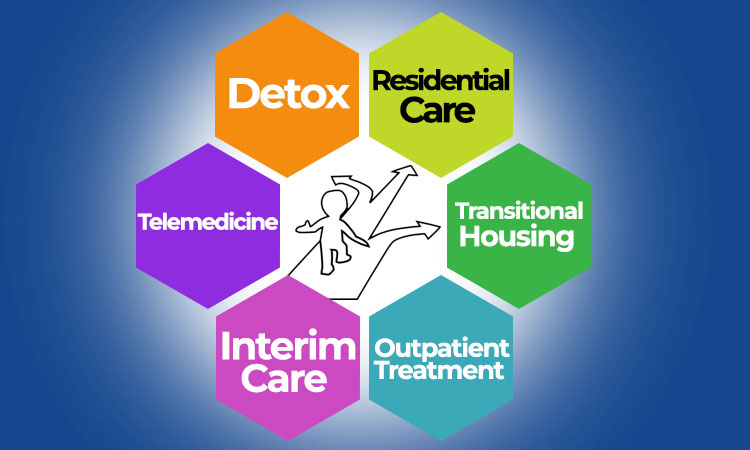Addiction Treatment Options
Several forms of addiction treatment are available. It's critical for treatment to be effective, and that often means choosing a treatment plan that's designed to address the specific needs of the individual. Here are some of the most common choices.
Detox
Detoxification is the most common first step for those with moderate to severe addiction, lasting between 3 and 10 days. During this process, the body detoxes from the toxins from the drugs and alcohol, which may lead to the onset of withdrawal symptoms. In detox, patients receive support for that process.
Hospital Inpatient Care
For those who have a severe addiction, it's not uncommon to enter treatment through a hospital inpatient treatment. This type of treatment provides around the clock care for several days or weeks to stabilize a person. This isn't a long-term or full treatment process, but it provides a way to stabilize mental and physical health while beginning to treat addiction.
Residential Care
Residential care provides support for a person for a month to as long as a year. The individual lives at the treatment center during this time. During this care, an individual will work on mental health and physical ailments, develop skills to manage stress, and learn about their addiction. The goal is often to help individuals and their families deal with the long-term effects of addiction. Residential care is often necessary for people with serious forms of addiction who need a safe, drug-free environment to recover. During residential care, a variety of therapies may be used to help a person to learn to cope with their addiction, including cognitive-behavioral therapy, dialectical behavior, individual therapy, and group therapy.
Transitional Housing
After leaving residential care, some people will not be able to go directly home, perhaps because they do not have a stable, drug-free environment or for other reasons. Transitional housing, sometimes called a halfway house, can offer support for a few months while a longer term solution can be supported. In traditional housing, a person will learn skills to live independently, perhaps get help finding a job, continuing their education, and managing the daily tasks needed to live a healthy life on their own. Often, they will work to find a home or work to build financial stability.
Outpatient Treatment
Drug and alcohol addiction doesn't stop at inpatient therapy but can continue for years to come. With outpatient therapy, a person lives at home while coming into a treatment setting for help on a routine basis. Sometimes, especially initially, outpatient treatment will include therapy sessions numerous times a week. Over time, as a person works to meet their goals, the time between therapies increases until they find themselves in a more stable place. Outpatient therapy relies on a person being able and willing to come in for treatment on a routine basis, which means having reliable transportation.
Interim Care
For some people, getting into a treatment center can take time, especially if there are no available beds in a residential treatment program at this point. In this situation, interim care can be helpful. It provides an opportunity for a person to receive the immediate care they need, such as working through detoxing and therapy while living at home. Most individuals will receive medications that help control their symptoms of withdrawal and enable them to refrain from using substances. They may also receive immediate emergency counseling to help them to get through the difficult time they are in. Interim care isn’t a formal type of treatment in that it does not offer long-term recovery planning or diving into treatment needs. It’s more of a bridge to care as soon as it becomes available.
Co-Occurring Mental Health and Substance Use Treatment
Some people need help for not just drug and alcohol use but also for underlying mental health disorders that may exist as well. It is very common for a person to need care that addresses both of these conditions, called co-occurring disorders, at the same time. Treating one without the other may yield ineffective results, putting a person at risk for health complications or limitations on recovery. Since many people with substance use disorder also have disorders such as anxiety, depression, post-traumatic stress disorder, bipolar disorder, or others, co-occurring mental health and substance use treatment is very common.
Telemedicine
Telemedicine is a mode of receiving therapy. Often, the same type of treatment a person needs (if they need outpatient care) can be completed online or over the phone. Telemedicine enables this. A person does not have to come into the treatment center for one-on-one care with their doctor but instead works with a therapist through an app on their phone or through phone calls. This type of treatment is best for those that do not need more aggressive treatment but also who are unable to get into treatment because of where they live.
About Author

Zack Preble
This content was contributed by a GovRehabs.us author.
Related Posts
Leave Your Comment
Your email address will not be published. Required fields are marked an are required.





